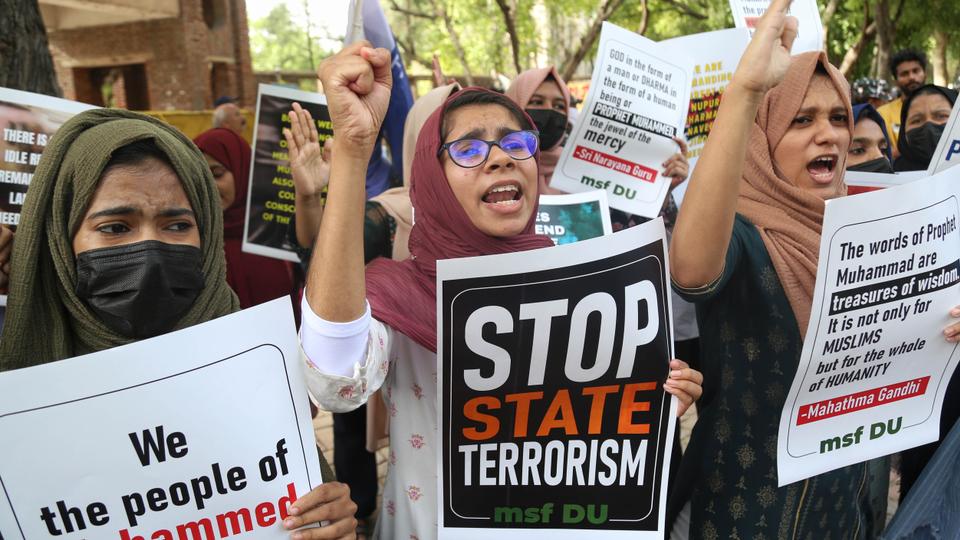AhlulBayt News Agency: India's secular character must be preserved and protected, and states must take action to stop hate speeches, the country's top court has said, in response to a petition asking for action on such utterances against the Muslim community.
A two-judge bench of the country's Supreme Court on Friday ordered police chiefs of two states and the national capital of Delhi to take action against hate speeches, "irrespective of the religion that the maker of the speech or the person who commit such act belongs to."
The petition, filed by a Muslim man, asked the court to direct state authorities to take action against what he said were widespread hate speeches against the Muslim community.
"The complaint of the petitioner is one of despondency and angst," justices K M Joseph and Hrishikesh Roy said in their interim order on Friday.
Earlier this week, UN chief Antonio Guterres chided India over its human rights record.
"As an elected member of the Human Rights Council, India has a responsibility to shape global human rights, and to protect and promote the rights of all individuals, including members of minority communities," Guterres said in a speech in Mumbai during a visit on Wednesday.
Critics and journalists under pressure
Prime Minister Narendra Modi's Hindu nationalist party and allies are accused by critics and opposition leaders of marginalising the country's Muslims, but the party strongly denies the claim and says it treats people of all religions equally.
Since Modi came to power in 2014 in the Hindu-majority nation, campaigners say persecution and hate speech have accelerated against religious minorities, especially India's 200-million-strong Muslim minority.
Pressure has also grown towards government critics and journalists, particularly women reporters – some have suffered relentless campaigns of online abuse including death and rape threats.
This is particularly the case in India-administered Kashmir since the Modi government in 2019 imposed direct rule on the restive Muslim-majority region where it has half a million troops stationed, activists say.
Atrocities on Muslims
Critics say Modi has failed to intervene and stop rising incidents of attacks on minorities, misuse of religion by Hindu hardliners, and intolerance against dissent in the country.
Hindu mobs have lynched dozens of people — mainly Muslims and Dalit Hindus — suspected of illegally transporting cows or consuming beef.
Muslims were also accused of spreading Covid-19 while Hindu mobs have targeted Muslims praying on Fridays in northern India.
Hindu monks known for their incendiary anti-Muslim rhetoric have been calling for Rohingya-type ethnic cleansing of Indian Muslims.
In June, Modi's Bharatiya Janata Party faced diplomatic backlash after Qatar, Kuwait and Iran summoned the country's envoys over insulting remarks on Islam's Prophet Muhammad by two of its officials, with several other Muslim countries also voicing outrage and condemning the statements.
Photo From AA
/129
A two-judge bench of the country's Supreme Court on Friday ordered police chiefs of two states and the national capital of Delhi to take action against hate speeches, "irrespective of the religion that the maker of the speech or the person who commit such act belongs to."
The petition, filed by a Muslim man, asked the court to direct state authorities to take action against what he said were widespread hate speeches against the Muslim community.
"The complaint of the petitioner is one of despondency and angst," justices K M Joseph and Hrishikesh Roy said in their interim order on Friday.
Earlier this week, UN chief Antonio Guterres chided India over its human rights record.
"As an elected member of the Human Rights Council, India has a responsibility to shape global human rights, and to protect and promote the rights of all individuals, including members of minority communities," Guterres said in a speech in Mumbai during a visit on Wednesday.
Critics and journalists under pressure
Prime Minister Narendra Modi's Hindu nationalist party and allies are accused by critics and opposition leaders of marginalising the country's Muslims, but the party strongly denies the claim and says it treats people of all religions equally.
Since Modi came to power in 2014 in the Hindu-majority nation, campaigners say persecution and hate speech have accelerated against religious minorities, especially India's 200-million-strong Muslim minority.
Pressure has also grown towards government critics and journalists, particularly women reporters – some have suffered relentless campaigns of online abuse including death and rape threats.
This is particularly the case in India-administered Kashmir since the Modi government in 2019 imposed direct rule on the restive Muslim-majority region where it has half a million troops stationed, activists say.
Atrocities on Muslims
Critics say Modi has failed to intervene and stop rising incidents of attacks on minorities, misuse of religion by Hindu hardliners, and intolerance against dissent in the country.
Hindu mobs have lynched dozens of people — mainly Muslims and Dalit Hindus — suspected of illegally transporting cows or consuming beef.
Muslims were also accused of spreading Covid-19 while Hindu mobs have targeted Muslims praying on Fridays in northern India.
Hindu monks known for their incendiary anti-Muslim rhetoric have been calling for Rohingya-type ethnic cleansing of Indian Muslims.
In June, Modi's Bharatiya Janata Party faced diplomatic backlash after Qatar, Kuwait and Iran summoned the country's envoys over insulting remarks on Islam's Prophet Muhammad by two of its officials, with several other Muslim countries also voicing outrage and condemning the statements.
Photo From AA
/129

